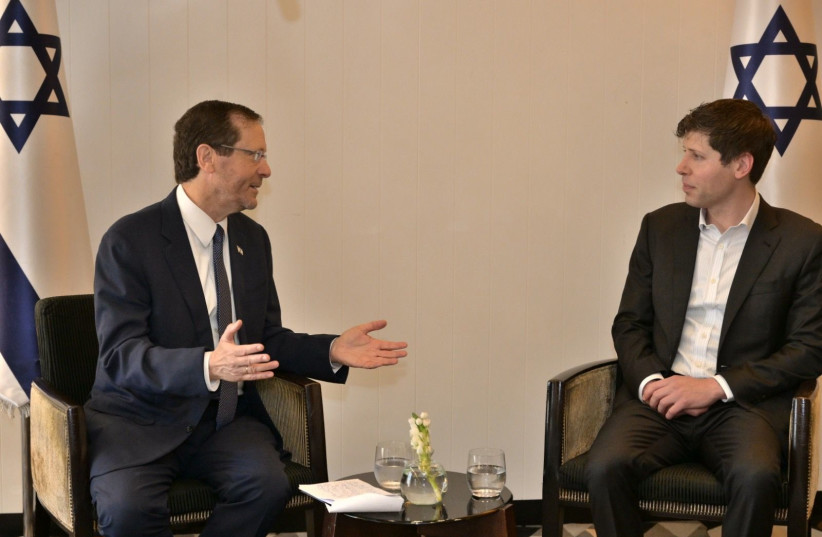In the span of a week, Prime Minister Benjamin Netanyahu made headlines for speaking with Sam Altman, CEO of OpenAI, and Elon Musk, about the transformative role of AI. Following those talks, Netanyahu declared he would establish a national policy and strategy for the use and development of AI.
But if Netanyahu is looking to Altman and Musk for ideas on how to develop that policy, he’s overlooking a treasure that lies at his feet.
It is much like the hero of Paulo Coelho’s The Alchemist, (spoiler alert), who dreams about hidden treasure, travels the world to find it, and gets robbed by thieves who laugh at him and tell him they also dreamed about buried treasure – which turns out to be buried where the boy had his original dream.
Even more ironic is the fact that AI technology is not something new for Israel; the IDF has been developing advanced AI-based defense systems for years, and one of the most important AI-based vision technology products in the world – Mobileye – was built and developed in Israel.
Israel's growing AI industry

The numbers tell the Israeli AI story: Eleven Israeli AI firms made CB Insight’s list of 2022’s Top 100 AI Startups, meaning that more than 10% of the world’s top AI startups are Israeli – and these are just 11 of the over 1,200 such startups and veteran firms located in the country.
Clearly, Netanyahu doesn’t need advice from Musk or Altman in order to develop a national AI policy; there are plenty of AI experts right at home whom he can draw on for advice and policy development.
Developing a comprehensive policy and framework to nurture the development of a thriving AI sector would seem to be the logical thing for Netanyahu to do; yet neither he – nor his predecessors in office – have done so.
And it’s not as if the resources aren’t there; Israel ranks fifth overall in country preparedness for AI, with the talent, academic and R&D, and physical infrastructure (high-speed Internet, electricity, super-computing capabilities, etc.) already in place needed to make it a world leader.
While there is a clear disconnect here between Israel’s AI industry and the government’s support of that industry, Netanyahu has experience in developing those kinds of policies; nearly a decade ago, he made it Israel’s mission to become a world leader in cybersecurity, a mission he helped the country achieve.
AI as a line of defense
To do that, his government established the National Cyber Directorate, which coordinates cybersecurity development policy between government, universities, and private corporations, as well as ensuring that Israeli websites, both public and private, are protected from cyberattacks. It also works with startups, helping to fund promising ideas and assisting with R&D development.
It's time that a similar effort, now long overdue, be made for AI. The country, however, needs not just a strategy, as Netanyahu stated, but a National AI Directorate. Israel clearly has the experience and expertise required for a National AI Directorate, which could immensely increase the country’s international profile for AI innovation.
A coordinated policy between private companies, government offices, and academic institutions could help further establish Israel as a responsible and innovative leader in the next iteration of artificial intelligence –
Generative AI.
Further, a comprehensive framework of government support would help ensure that the most interesting potential investment opportunities in AI in Israel – including in healthcare, cybersecurity, dual-use defense tech, and AI infrastructure – come to fruition, attracting funds from around the world.
We have seen through our work and research that many top AI researchers and institutions in Israel feel they are not receiving adequate public funding or even access to facilities with enough computing power for their research to reach its potential.
A coordinated framework would help solve that, and bring Israel to the cutting edge of the global AI industry. In addition, such efforts would lead to increased government spending on AI in military R&D – an approach that proved successful in turning Israel into a Start-Up Nation in the 2000s.
An AI Directorate that marshals all of Israel’s resources toward building a solid development platform, where all aspects of the country’s AI “machine” work together for new successes, will place it at the forefront of an industry that the entire world is pursuing.
With a declared intent to put policies in place, let’s hope that Netanyahu and his government work closely with Israel’s AI industry to not just build the right policies, but to provide the support needed to further boost Israel’s AI prowess, enabling the country to fully unearth the treasure that is already here, beneath our feet.
